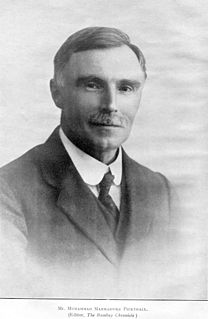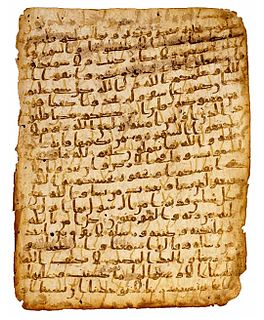Related Research Articles

The Quran, also romanized Qur'an or Koran, is the central religious text of Islam, believed by Muslims to be a revelation from God. It is organized in 114 chapters, which consist of verses. In addition to its religious significance, it is widely regarded as the finest work in Arabic literature, and has significantly influenced the Arabic language.
Islamic studies refers to the academic study of Islam, and generally to academic multidisciplinary "studies" programs—programs similar to others that focus on the history, texts and theologies of other religious traditions, such as Eastern Christian Studies or Jewish Studies but also fields such as —where scholars from diverse disciplines participate and exchange ideas pertaining to the particular field of study.

Ibn Warraq is the pen name of an anonymous author critical of Islam. He is the founder of the Institute for the Secularisation of Islamic Society and used to be a senior research fellow at the Center for Inquiry, focusing on Quranic criticism. Warraq is the vice-president of the World Encounter Institute.

Muhammad Marmaduke Pickthall was an English Islamic scholar noted for his 1930 English translation of the Quran, called The Meaning of the Glorious Koran. His translation of the Qur'an is one of the most widely known and used in the English-speaking world. A convert from Christianity to Islam, Pickthall was a novelist, esteemed by D. H. Lawrence, H. G. Wells, and E. M. Forster, as well as a journalists, political and religious leaders. He declared his conversion to Islam in dramatic fashion after delivering a talk on 'Islam and Progress' on 29 November 1917, to the Muslim Literary Society in Notting Hill, West London.
George Sale (1697–1736) was a British Orientalist scholar and practising solicitor, best known for his 1734 translation of the Quran into English. In 1748, after having read Sale's translation, Voltaire wrote his own essay "De l'Alcoran et de Mahomet".

Sir Hamilton Alexander Rosskeen Gibb, known as H. A. R. Gibb, was a Scottish historian and Orientalist.
The historiography of early Islam is the scholarly literature on the early history of Islam during the 7th century, from Muhammad's first revelations in 610 until the disintegration of the Rashidun Caliphate in 661, and arguably throughout the 8th century and the duration of the Umayyad Caliphate, terminating in the incipient Islamic Golden Age around the beginning of the 9th century.

Leone Caetani, Duke of Sermoneta, was an Italian scholar, politician, and historian of the Middle East.

In Islam, ’i‘jāz or inimitability of the Qur’ān is the doctrine which holds that the Qur’ān has a miraculous quality, both in content and in form, that no human speech can match. According to this doctrine the Qur'an is a miracle and its inimitability is the proof granted to Muhammad in authentication of his prophetic status. It serves the dual purpose of proving the authenticity of its divineness as being a source from the creator; and proving the genuineness of Muhammad's prophethood to whom it was revealed as he was one bringing the message.

There are many English translations of the Quran. The first translations were created in the 17th and 19th centuries, but the majority of existing translations have been produced in the 20th and 21st centuries.

Michael Allan Cook FBA is a British historian and scholar of Islamic history. Cook is the general editor of The New Cambridge History of Islam.

Criticism of the Quran is an interdisciplinary field of study concerning the factual accuracy of the claims and the moral tenability of the commands made in the Quran, the holy book of Islam. The Quran is viewed to be the scriptural foundation of Islam and is believed by Muslims to have been sent down by God (Allah) and revealed to Muhammad by the angel Jabreel (Gabriel). It has been subject to criticism both in the sense of being studied by mostly secular Western scholars and in being found fault with.

The historicity of Muhammad refers to the study of Muhammad as a historical figure and critical examination of sources upon which traditional accounts are based.

Rawżat aṣ-ṣafāʾ fī sīrat al-anbiyāʾ w-al-mulūk w-al-khulafāʾ or Rawdatu 's-safa is a Persian-language history of the origins of Islam, early Islamic civilisation, and Persian history by Mīr-Khvānd. The text was originally completed in seven volumes in 1497 AD; the eighth volume is a geographical index. The work is very scholarly, Mīr-Khvānd used nineteen major Arabic histories and twenty-two major Persian ones as well as others which he occasionally quotes. His work was the basis for many subsequent histories including the works of Hajjī Khalfah.

Abū Muhammad al-Qāsim ibn Alī ibn Muhammad ibn Uthmān al-Harīrī, popularly known as al-Hariri of Basra was an Arab poet, scholar of the Arabic language and a high government official of the Seljuks.

Islamic holy books are the texts which Muslims believe were authored by Allah through various prophets throughout humanity's history. All these books, in Muslim belief, promulgated the code and laws that God ordained for people.
Soviet Orientalist studies in Islam are academic discourses by Soviet Marxist theoreticians about Islam, its origins and development based on historical materialism and Muslims. The central question of this discourse was how Muslim society would fit into the general development of human history. Prominent Soviet orientalists include Mikhail A. Reisner, Evgenii Beliaev, Liutsian I. Klimovich, Mikhail L. Tomara, V. Ditiakin and Sandzhar D. Asfendiarov.

William Girdlestone Shellabear (1862–1947) was a "pioneer" scholar and missionary in British Malaya. He was known for both his appreciation of Muslim society and also his translation of the Bible into the Malay language.
William Goldsack (1871–1957) was an Australian Baptist Missionary Society missionary to East Bengal, India.